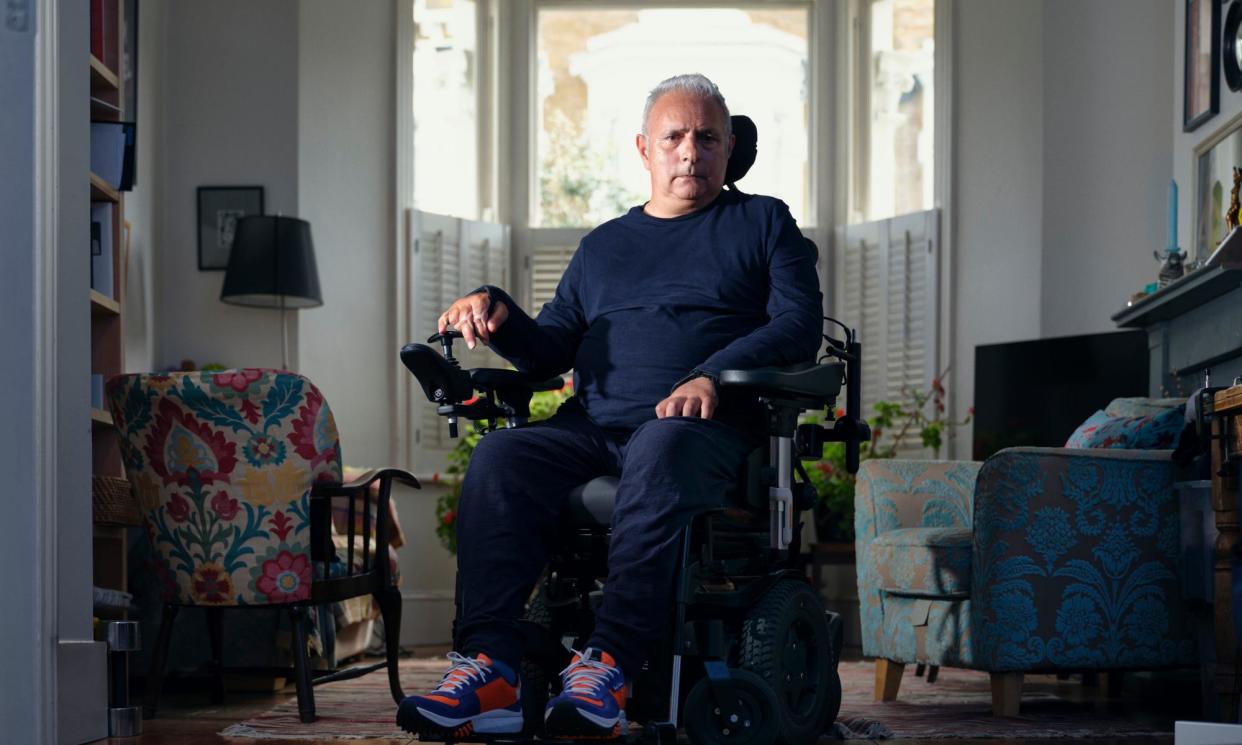In My Own Words: Hanif Kureishi review – so frank it’s breathtaking

Photograph: David Emery/BBC/Turbine Studios
‘I was drinking a beer, smoking a joint, watching the football,” recalls Hanif Kureishi in the powerful opening frames of In My Own Words. “Everything went fuzzy and I landed on my head.” These are the last moments the writer recalls from Boxing Day 2022 in Rome, before the fall that crushed his spinal cord, leaving him paralysed. Unable to move his arms or legs, he required constant care but was determined, nonetheless, to write. As those who have followed Kureishi’s extraordinary posts, dictated to his son since the accident, will know, he is not one to shy away from the truth of an experience, however devastating. “I was done for,” he says, his eyes a little glossy, his hangdog expression entirely serious. “My life was ruined.”
This is an intensely personal, unflinching, expletive-peppered documentary (it is Kureishi, after all), directed by his longtime friend and past collaborator Nigel Williams, which only increases the tenderness. Their camaraderie is lovely to witness. “I’m riding your bike in that picture, Nigel,” he says, commenting on footage of himself in Southall, west London, in the early 1980s, when he was researching his first play, which he wrote furiously in six weeks. Now and then Williams interjects – “You look good!” – to buoy up Kureishi, sitting in his wheelchair, watching younger, longer-haired and bell-bottomed versions of himself on screen. When Kureishi recalls the shame of walking out on his wife and twin babies not long after they were born, Williams reminds him, “You came back. You’re very hard on yourself.”
But Kureishi is neither hard nor soft on himself. He is merely interested in things as they are. This commitment to the truth is what characterises his trailblazing, often hilarious oeuvre, whether writing about growing up a horny brown boy – he refers to himself as “beige” – in Bromley, the particularities of English racism, micro-gradations of the class system, the rise of Islamic fundamentalism, the breakdown of his marriage, or the extreme vulnerability of his day-to-day existence since the accident. What really shines through is Kureishi’s love of people, conversation, life; which is to say writing. “Writing hasn’t stopped,” he says. “It keeps you alive.”
When he was growing up in the south London suburbs, his Pakistani father wanted him to be a cricketer. The first Indian to play for England! Unfortunately, he was terrified of the ball. His white English mother was clearly depressed. Kureishi spent a lot of his childhood being a “cheerer-upper”. There are reasons, often sad ones, why comic writers are as they are.
It’s pure pleasure to watch him rewatching, for the first time in decades, My Beautiful Laundrette (1985), directed by Stephen Frears and starring Daniel Day-Lewis as “the most beautiful skinhead you’ll ever see”. I had forgotten it is that rare and beautiful thing: a queer love story with a happy ending. My parents loved it. As for me, a fellow brown kid who grew up in the London suburbs (south-west in my case), my life was transformed, kickstarted, remade, all the big juicy things, by reading The Buddha of Suburbia. God, it was so funny! So Asian! So naughty! So us! Watching the 1993 TV series of the novel, Kureishi remembers asking David Bowie – who went to the same technical school in Bromley – if he could use his music in the film. “He said, ‘I thought you’d never ask … I’d love to do the soundtrack’.”
Time and time again, Kureishi nails it in a few words. Williams: “Did being mixed race create difficulties for you?” “It creates difficulties for other people, really,” Kureishi replies. Bang on. Or, in 1989, discussing the fatwa issued against Salman Rushdie: “This fanaticism will encourage people to be racist against Muslims and Pakistanis.” In the 1990s, he was kicked out of Whitechapel mosque while doing research. “Two guys came up: ‘Go on, put your shoes on, fuck off, we know you’re a friend of Salman Rushdie’s. Don’t come back here.” They threw him down the stairs. He says it was like being kicked out of a pub at closing time.
The final 10 minutes turn to the accident. We see Kureishi’s son shaving him in hospital; his partner, Isabella d’Amico, feeding him an ice-cream; footage just after the fall, which Kureishi has never seen. “I look like my dad,” he says. “I look pretty rough, bloody hell.”
“Did you get very low?” Williams asks. “I’m still low,” Kureishi replies. “The loss of your life … is so devastating. To be so vulnerable, even today, now, watching this … I feel I could die at any moment.”
His frankness is breathtaking. He says he lives in “a zone of death”, yet everyone tells him he is unchanged. That is clear from watching this beautiful, unsentimental film. The final question is the perfect setup for a classic Kureishi payoff. Williams: “Has your life gone according to plan?”
“It would be absurd, wouldn’t it, to have a plan for a life,” he replies. “It’s such a stupid, late-capitalistic idea of what a life would be. It would be like having a plan for a conversation. It’s a dickhead idea, I think.”
• In My Own Words: Hanif Kureishi was shown on BBC One and is on iPlayer now


